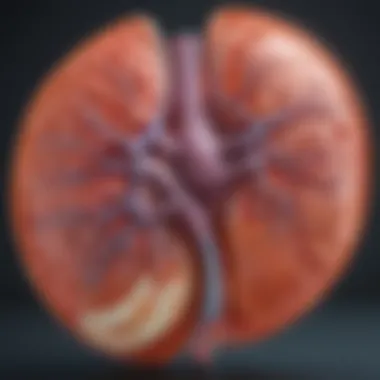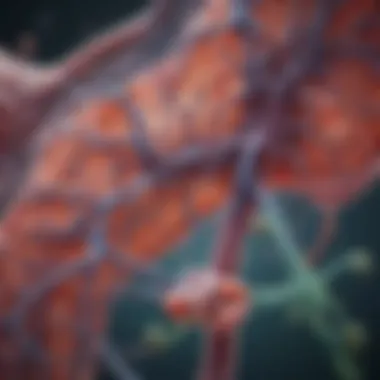Impact of Long-term PPI Use on Kidney Health


Intro
Proton pump inhibitors (PPIs) have become a staple in treating gastrointestinal disorders such as gastroesophageal reflux disease (GERD). Over time, a growing number of individuals have found themselves relying on these medications for extended periods. While mainly prescribed to alleviate symptoms, the shadows of long-term use include potential risks that warrant discussion, specifically concerning kidney health. Though the therapeutic benefits are undisputed, the question looms—are the kidneys paying the price for our reliance on PPIs?
In the realm of prescription medications, PPIs like omeprazole, lansoprazole, and esomeprazole are commonly recognized. They work by blocking acid production in the stomach, bringing relief to those suffering from chronic heartburn and ulcer conditions. However, recent studies have triggered red flags regarding their long-term usage. The connection between PPIs and kidney disease is emerging as a significant concern, and navigating this landscape requires an understanding of the underlying mechanisms, epidemiological data, and potential health implications.
This article will undertake a thorough examination of this complex relationship. From the pinpointing of the key findings and research highlights to the elaboration of methodologies and clinical applications, we'll dissect the layers behind the impact of long-term PPI use on kidney function. Our aim is to equip healthcare professionals, researchers, and informed individuals with a nuanced comprehension of the trade-offs associated with these medications. By taking a closer look at current studies and emerging data, we can appreciate both the therapeutic benefits of PPIs and the adversities they may bring upon renal health.
Let’s embark on a journey through this critical analysis, exploring how these common medications could silently compromise kidney health over prolonged use.
Understanding Proton Pump Inhibitors
Proton pump inhibitors (PPIs) have become staples in modern medicine, particularly for treating gastric acid-related disorders. They block the proton pump in the stomach lining, effectively reducing acid production. It's essential to grasp not just what PPIs do, but also the significant role they play in patient care. Understanding these medications can shine a light on their potential effects beyond the digestive system, particularly concerning kidney health.
Recognizing how commonly these drugs are prescribed might inspire both patients and healthcare providers to stay informed about the associated risks.
Definition and Mechanism of Action
PPIs such as omeprazole and lansoprazole have a clear definition: they are a class of drugs designed to inhibit gastric acid secretion. They work by blocking the H+/K+ ATPase enzyme system of the gastric parietal cells. This action leads to a pronounced decrease of acid production in the stomach, helping to manage conditions like gastroesophageal reflux disease (GERD) and peptic ulcers.
- Key Mechanism: The proton pump, being the final step in the acid secretion process, means that when PPIs inhibit this enzyme, the end result is a significant reduction in stomach acid.
- Biological Impact: Because these medications affect the body’s natural acidity levels, they can influence gastric and intestinal environments, potentially leading to systematic effects, including those on the kidneys.
Common Uses of PPIs
The use of PPIs covers a broad spectrum of gastrointestinal conditions. Among the most common applications are:
- GERD: This chronic digestive disorder causes stomach acid to flow back into the esophagus. PPIs help to alleviate the frequent heartburn and discomfort.
- Ulcers: Both gastric and duodenal ulcers benefit from PPI treatment, as these medications promote healing by reducing acid levels.
- Zollinger-Ellison Syndrome: A rare condition where the stomach produces too much acid, requiring medical intervention with PPIs for control.
- Prevention of Acidity-Related Complications: Patients on long-term NSAIDs or corticosteroids often take PPIs to stave off related gastrointestinal issues.
It's vital to note that while the therapeutic advantages of PPIs are notable, their long-term use should not be taken lightly given emerging studies linking extended usage to kidney impairment. Awareness of how these medications function and where they fit into treatment regimens is crucial for safe and effective patient care.
Kidney Function and Disease Overview
Understanding kidney function and related diseases is crucial in the context of prolonged proton pump inhibitor (PPI) use, as it allows for better insights into the potential risks associated with these medications. The kidneys serve multiple essential roles, including filtering waste from the blood, regulating electrolyte levels, and maintaining fluid balance in the body. When the kidneys falter, the entire body can feel the ripple effects, leading to a myriad of health issues.
Being aware of how PPIs interact with kidney function can aid healthcare providers in making informed decisions regarding treatment plans. Moreover, exploring the types of kidney diseases helps in identifying specific risks associated with long-term PPI use, ultimately improving patient outcomes.
Basics of Kidney Function
The kidneys function like nature's finest filtration system. They receive blood, filter out toxins and excess substances, and return cleansed blood to the bloodstream. Here's a closer look at their intricate workings:
- Filtration of Blood: Each kidney has approximately one million tiny structures called nephrons. Within each nephron, blood is filtered through a glomerulus, allowing waste and excess water to pass into the urine while retaining valuable components like proteins and red blood cells.
- Regulation of Electrolytes: Electrolytes like sodium, potassium, and calcium play vital roles in various bodily functions. The kidneys regulate these substances to maintain equilibrium, ensuring that processes like muscle contractions and nerve signaling function well.
- Acid-Base Balance: The kidneys balance the body’s pH by absorbing bicarbonate and excreting hydrogen ions as necessary, thus keeping the blood slightly alkaline.
- Hormone Production: Besides filtration, kidneys produce essential hormones. For instance, erythropoietin stimulates red blood cell production in the bone marrow while also regulating blood pressure through the renin-angiotensin system.
This delicate balance ensures that the body operates like a well-tuned machine. A breakdown in any of these functions can lead to kidney problems.


Types of Kidney Disease
Kidney diseases are often segmented into different categories based on their underlying causes and impacts:
- Chronic Kidney Disease (CKD): A progressive loss of kidney function over time, CKD often results from conditions like diabetes, hypertension, and glomerulonephritis. Early identification is key, but many patients remain asymptomatic until advanced stages.
- Acute Kidney Injury (AKI): This condition occurs suddenly and is often reversible if treated promptly. Causes can include severe dehydration, infections, or acute obstruction. AKI can lead to significant health complications if not managed effectively.
- Glomerular Diseases: These target the kidneys’ filtering units, resulting in proteinuria, hematuria, or impaired function. This includes conditions like nephrotic syndrome, which can arise from various causes.
- Polycystic Kidney Disease (PKD): A genetic disorder characterized by the presence of multiple cysts in the kidneys, PKD leads to progressive loss of kidney function and associated complications.
- Kidney Stones: Formed from mineral buildup, kidney stones can cause sharp pain and, if obstructing the flow of urine, may lead to infections or kidney damage.
"Kidney disease doesn’t always show symptoms until it's too late; awareness is critical to early diagnosis and treatment."
These types of kidney diseases highlight the variety of challenges kidneys face and underline the importance of regular monitoring, especially for those on long-term medications like PPIs. Understanding these diseases provides a critical framework for evaluating the potential renal impacts of prolonged PPI usage.
The Link Between PPIs and Kidney Disease
The relationship between long-term use of proton pump inhibitors (PPIs) and kidney disease is becoming a growing concern among healthcare professionals and patients alike. The topic is significant not just for its clinical implications, but also for the broader understanding of how common medications can impact health over time. This section aims to bridge the existing knowledge gaps, shedding light on how the prescription of PPIs could, in the long run, have deleterious effects on renal health.
As we delve into the specifics, the evidence suggests that while PPIs like omeprazole and esomeprazole are effective for managing gastrointestinal disorders, their long-term usage may align with an increased incidence of kidney issues. It's essential for medical practitioners to weigh the benefits against potential risks, ensuring that patients are informed and monitored appropriately.
Epidemiological Studies
Epidemiological studies have provided valuable insights into the prevalence of kidney disease among those who have been on long-term PPI therapy. A variety of research efforts have highlighted a worrying pattern—a connection between extended PPI use and an elevated risk of chronic kidney disease (CKD). In particular, a study published in the Journal of the American Society of Nephrology found that individuals regularly taking PPIs had around a 20 to 50 percent higher risk of developing CKD compared to non-users. This significant disparity raises eyebrows and calls for rigorous scrutiny into the medication's safety profiles when prescribed over extended periods.
Moreover, it’s not just CKD that is at stake. Some studies indicated higher rates of acute interstitial nephritis, a potentially reversible condition that can escalate if not identified early. Validating these observations can help inform healthcare protocols, guiding the monitoring of kidney function in patients using these medications long-term.
Potential Biological Mechanisms
Understanding the biological mechanisms behind how PPIs may impact renal health is equally relevant. There are a couple of proposed pathways that merit further attention:
Inhibition of Tubular Function
One of the proposed mechanisms is the inhibition of tubular function, which can alter the kidneys’ ability to regulate electrolyte balance and waste removal. Essentially, the kidney's tubular cells, responsible for reabsorbing essential substances while excreting waste, may become compromised due to PPI administration. This effect can lead to disruptions in the normal filtering capabilities of the kidneys.
A hallmark feature of this mechanism is the involvement of renal tubular atrophy—essentially, the shrinking of those crucial cells. Its implications can be far-reaching, as it not only affects kidney function but can also pave the way for more serious renal diseases. Highlighting this aspect elucidates why monitoring renal function is vital for anyone on long-term PPI therapy.
Altered Gut Microbiome
Moreover, altered gut microbiome represents another crucial mechanism linking PPIs to kidney issues. PPIs significantly modify the gut flora by influencing gastric acidity. This may pave the way for dysbiosis—an imbalance in gut bacteria, which has broader implications for health, including renal function.
When gut bacteria are thrown out of balance, systemic inflammation can ensue, potentially leading to adverse outcomes on good kidney function. A distinguishing feature of this particular mechanism is its indirect approach; rather than harming the kidneys directly, it hints at a more complex interaction involving the entire body's physiological network.
The ramifications of this alteration can lead to a cycle of chronic disease, making it paramount for researchers and clinicians to assess dietary and lifestyle modifications alongside medication use.
"The underlying complexity of kidney function and its interactions with drug therapies like PPIs necessitates a reevaluation of long-term prescription strategies to mitigate risks associated with their use."
This nuanced understanding underscores the importance of using PPIs judiciously, balancing their proven benefits against the potential long-term effects on kidney health. The amalgamation of epidemiological data and biological insights paints a clearer picture for not just patients, but also healthcare providers who play a critical role in managing these therapies.


Impact of Long-term PPI Use on Renal Health
The significance of understanding the impact of long-term PPI use on renal health cannot be overstated. Proton pump inhibitors have become a go-to solution for various gastrointestinal disorders, yet their extensive application prompts a closer examination of the potential ramifications on kidney function. Although these medications effectively reduce stomach acid levels, leading to relief from conditions like gastroesophageal reflux disease, their prolonged usage raises concerns in the context of renal health.
Prolonged exposure to PPIs could potentially contribute to the deterioration of kidney function, a notion supported by emerging research. For instance, certain studies indicate an increased prevalence of chronic kidney disease among individuals who regularly use PPIs for an extended time. Recognizing these implications is crucial as it emphasizes the necessity for both patients and healthcare providers to remain vigilant when prescribing such medications.
Prevalence of Kidney Disease in Long-term Users
Recent investigations shed light on the disturbing trend of kidney disease prevalence among long-term PPI users. For example, research published in reputable medical journals emphasizes a striking correlation between chronic PPI use and the onset of renal dysfunction. Data suggest that individuals using these medications regularly for more than two years may exhibit a 20-50% increased risk for developing chronic kidney disease compared to non-users.
- Duration of Use: The risk seems to escalate with the duration of use, with users beyond 5 years facing even higher susceptibility.
- Underlying Conditions: It’s also essential to consider that those prescribed PPIs often have gastrointestinal issues, which could complicate overall health and mask underlying kidney concerns.
Moreover, one large-scale cohort study indicated that prolonged PPI usage led to a noticeable decline in estimated glomerular filtration rate (eGFR), a critical marker of kidney health. Such findings call for increased scrutiny in long-term PPI therapy and encourage more thorough monitoring of renal function among chronic users.
Clinical Implications of Renal Impairment
The clinical ramifications of renal impairment as a consequence of long-term PPI use are multifaceted and warrant serious attention. As kidney function declines, several interconnected health issues may arise:
- Fluid Balance Disruption: The kidneys are vital for maintaining fluid balance. They help regulate the body's fluid levels, and impaired renal function can lead to fluid overload, resulting in complications like hypertension.
- Electrolyte Imbalance: Kidney dysfunction can disturb the balance of electrolytes, causing conditions such as hyperkalemia or hypocalcemia, which not only impact muscle function but also have critical ramifications for heart health.
- Medication Dosage Adjustments: With compromised kidney function, the dosing of many medications needs careful reevaluation. Drugs that depend on renal clearance may accumulate in the body, leading to toxicity.
"Monitoring kidney function must become a routine practice for anyone on long-term PPI therapy to avert potential health risks."
Regulatory and Clinical Guidelines
Understanding the regulatory and clinical guidelines regarding the use of proton pump inhibitors (PPIs) is crucial for both healthcare professionals and patients. These guidelines play a significant role in ensuring safe prescribing practices and monitoring patient outcomes. As long-term PPI use has been associated with various health risks, including kidney disease, awareness of these guidelines helps healthcare providers mitigate potential complications while still utilizing these medications for their therapeutic benefits.
Healthcare recommendations often stem from extensive research. As it pertains to PPIs, these guidelines are rooted in studies that analyze both the effectiveness of the medication and the possible adverse effects. It is important for clinicians to stay updated on current guidelines so they can make informed decisions. This includes understanding the patient’s specific condition, potential medication interactions, and the duration for which PPIs should be prescribed. One significant component of these guidelines is the balance between the risks and the benefits of using PPIs over a prolonged period.
"Guidelines act as a beacon for clinicians, guiding through the murky waters of prescription and monitoring."
Current Recommendations for PPI Use
Current clinical recommendations advocate for the judicious use of PPIs. Despite their effectiveness in treating conditions like gastroesophageal reflux disease or ulcers, it is vital that their use is regularly reassessed. Most guidelines suggest that PPIs should be prescribed at the lowest effective dose and for the shortest duration necessary to manage symptoms. This is primarily to minimize the risk of side effects, which may include not only kidney disease but also fractures, gastrointestinal infections, and other complications.
Moreover, in cases where a patient necessitates long-term PPI therapy, doctors should schedule routine evaluations to determine if continued use is warranted. Important considerations also include:
- Assessing patient history for any pre-existing kidney issues or other conditions that might amplify the risks associated with PPI use.
- Regularly monitoring renal function through blood tests to keep tabs on any changes.
- Discussing alternatives with patients, which might include lifestyle changes or other classes of medications, to potentially reduce reliance on PPIs.
Monitoring Kidney Function in PPI Users
Monitoring kidney function is essential for patients who are on long-term PPI therapy. Given the potential association between prolonged PPI use and kidney impairment, regular assessment becomes a vital part of patient care. Healthcare providers should establish a baseline kidney function before initiating PPI therapy, generally through blood tests measuring serum creatinine and estimated glomerular filtration rate (eGFR).
Subsequent kidney function tests should be scheduled periodically. This monitoring serves to detect any early signs of renal dysfunction, enabling timely interventions if needed. Key factors during monitoring include:


- Looking for signs of acute kidney injury or chronic kidney disease which might arise from cumulative PPI usage.
- Educating patients about symptoms that may indicate kidney issues, such as changes in urination, swelling, or fatigue.
- Keeping an eye on electrolyte levels, as PPIs can impact magnesium and calcium balance, eventually affecting renal health.
Alternatives to Proton Pump Inhibitors
The discussion surrounding alternatives to proton pump inhibitors (PPIs) is increasingly pertinent, given the rising concerns about their potential long-term implications on kidney health. Despite PPIs being the go-to solution for various gastrointestinal issues, there are various other options worth considering. This section will explore both medications and lifestyle modifications that can alleviate gastrointestinal discomfort while posing fewer risks to renal function.
Other Medication Options
Receptor Antagonists
receptor antagonists are a class of medications that work by blocking histamine receptors in the stomach, leading to reduced acid production. One notable feature of these drugs, such as ranitidine and famotidine, is their shorter duration of action compared to PPIs. This characteristic can be advantageous for patients needing intermittent relief rather than continuous acid suppression. While they don’t provide the same level of acid control as PPIs, their safety profile is generally more favorable concerning long-term use and kidney health.
receptor antagonists can be beneficial due to their rapid action and lower side effects when taken over extended periods. They are particularly popular among those who require occasional relief without the drawbacks associated with prolonged PPI use. However, it's essential to note that tolerance may develop over time, eventually requiring larger doses for the same effect. Still, for individuals wary of the renal risks tied to PPIs, receptor antagonists can serve as a practical alternative.
Antacids
Antacids, such as Tums and Maalox, are another option for treating heartburn and acid reflux. The primary characteristic of antacids is their fast-acting nature. They provide immediate relief by neutralizing stomach acid, making them a favorite among those seeking quick fixes. Importantly, antacids are generally regarded as safe for short-term use and come with the added benefit of being widely available over-the-counter.
A significant advantage of using antacids is their safety profiles and lack of systemic effects, which makes them particularly appealing for temporary relief without the risk factors associated with long-term medication use. However, because they do not prevent acid production, they may not be suitable for chronic conditions requiring ongoing treatment. Moreover, excessive use can lead to side effects like constipation or electrolyte imbalances, hence requiring careful monitoring.
Lifestyle Modifications for Gastrointestinal Health
Beyond medications, lifestyle changes can play a pivotal role in managing gastrointestinal health. Strategies such as dietary modifications, maintaining a healthy weight, and avoiding known triggers can significantly reduce the symptoms of acid reflux or excessive heartburn. Some practical tips include:
- Adopting a balanced diet: Focus on whole foods like fruits, vegetables, lean proteins, and whole grains. This can help maintain digestive health.
- Timing meals: Eating smaller portions and not lying down right after meals can alleviate pressure on the stomach.
- Reducing weight: For individuals who are overweight, shedding even a few pounds can lessen symptoms.
- Avoiding triggers: Identifying and steering clear of items that exacerbate symptoms, such as spicy foods, caffeine, or alcohol.
Incorporating these adjustments can lead to improved gastrointestinal function and potentially diminish the need for medications, thereby contributing to better renal health over time.
Culmination: Implications for Practice and Future Research
The examination of the relationship between long-term proton pump inhibitor (PPI) use and kidney disease raises crucial implications for healthcare practitioners and patients alike. Given the growing reliance on PPIs for managing gastrointestinal disorders, it’s essential for practitioners to weigh the benefits against the risks associated with prolonged use. In particular, the potential for kidney impairment highlights a need for vigilance in monitoring renal function.
Although PPIs are widely prescribed and can effectively relieve symptoms of acid-related conditions, it’s important to remember that they are not without consequences.
Summary of Key Findings
Several crucial findings have emerged from the analysis:
- Epidemiological evidence indicates a higher prevalence of kidney disease among long-term PPI users compared to non-users.
- Potential biological mechanisms such as inhibition of tubular function and alterations in the gut microbiome might explain the observed renal effects.
- Healthcare providers should be increasingly aware of the long-term risks of PPI use, prompting a review of therapeutic strategies to manage gastrointestinal issues without compromising kidney health.
- Monitoring renal function in patients on prolonged PPI therapy is essential for early detection of renal impairment.
"The risk associated with prolonged use of proton pump inhibitors must not be overlooked; a careful balance between efficacy and safety is absolutely necessary."
Areas for Future Research
As we delve into the implications for future research, several important areas should be explored:
- Longitudinal studies: More comprehensive studies tracking patients over extended periods will provide clearer insights into the long-term renal effects of PPIs.
- Dose-response relationships: Understanding how different dosages affect kidney health could provide guidance on safe prescribing practices.
- Mechanistic studies: Further research into the biological underpinnings of PPI-induced kidney issues could illuminate potential interventions or alternate therapies.
- Population studies: Diverse cohorts should be studied to determine how variables such as age, sex, and comorbidities influence the risk of renal impairment with PPI use.
- Patient education: Investigating how empowering patients with knowledge about the risks associated with long-term PPI use might alter prescribing habits and lead to more informed patient choices.
In sum, as the landscape of PPI usage continues to evolve, it becomes increasingly evident that we must tread carefully, understanding the nuances of this powerful class of medications while safeguarding renal health.



